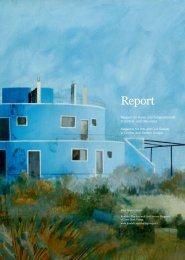Report_Issue 1/2009 - Jubiläum/ 20 Jahre Mauerfall
Report_Issue 1/2009 - Jubiläum/ 20 Jahre Mauerfall
Report_Issue 1/2009 - Jubiläum/ 20 Jahre Mauerfall
Sie wollen auch ein ePaper? Erhöhen Sie die Reichweite Ihrer Titel.
YUMPU macht aus Druck-PDFs automatisch weboptimierte ePaper, die Google liebt.
Slovenia: Instructions<br />
for a Visitor<br />
— Drago Jančar —<br />
Once upon a time, when he created the world,<br />
so it is recorded in a famous legend, once upon<br />
a time God had carefully distributed beauty<br />
equally all over the world, very economically<br />
and carefully, but in the end he still had a<br />
handful of beauty left over, so he scattered it<br />
across the country that today is called Slovenia.<br />
A literary journey by Drago Jančar, Slovenia’s<br />
best-known contemporary<br />
author, essayist and dramatist.<br />
If, someday, your path should lead you to the Istrian<br />
coast, or more exactly to the little old town<br />
of Piran, or still more exactly, to the stony tip of<br />
the town that reaches far out into the sea, then<br />
be careful, in the evening, not to become lost<br />
in the illusion of the colours that are sprayed<br />
out by the sun sinking into the sea beneath the<br />
clouds.<br />
Strain your eyes, and perhaps you will perceive,<br />
in the narrow crack between water and clouds,<br />
the shadows flitting about to and fro, flying<br />
towards you from the glowing sky across the<br />
bright surface of the sea, flying past way above<br />
your head and into the interior of the country,<br />
into its Alpine valleys and on to the other side,<br />
down towards the Pannonian plain. These are<br />
the melancholic daemons. You do not need to<br />
know them, you can be satisfied with tourist<br />
brochures that try to make you believe that you<br />
are “on the sunny side of the Alps”, in an old<br />
European country, in a country full of European<br />
prosperity, of the Baroque, good wines, and<br />
friendly and cheerful people.<br />
Should you, however, see the shadows that<br />
fly cross the sky, cleverly avoiding the densely<br />
planted church towers on the hills, the mountains<br />
and the plains, then you should know that<br />
the actual home of the melancholy daemons<br />
is there. They live in the Alpine basin: in the<br />
morning they fly down to the sea, and at evening<br />
return to the highlands, they live in the<br />
crowns of the trees and on the mountain ranges,<br />
in village inns and on the Sunday streets in<br />
empty towns.<br />
So empty on Sundays that the poet Tomaž<br />
Šalamun writes about them that there and in<br />
the countryside there is nothing, that was what<br />
his grandmother told him, when the poet was<br />
still a child and was boarding the train in Vienna.<br />
His grandmother had said: there is nothing<br />
in between, sleep until you get to Trieste, children,<br />
because there is nothing between Vienna<br />
and Trieste. Or only very minor things, as Milan<br />
Kundera says, Slovenia is so small, he writes<br />
that all the rivers only have one bank.<br />
Who should be interested in such an area<br />
anyway, where the people like to put up with<br />
things, where they put up with their melancholy<br />
daemons and themselves, where they put up<br />
with everything from their earliest childhood<br />
to their very last day; and, to wit, quietly, and<br />
with a malicious Schadenfreude towards their<br />
own and others’ tolerance, where glasses are<br />
not smashed and jazz is not played, since acquiescence<br />
is not particularly joyful, yet nor is<br />
it particularly sorrowful, but rather something<br />
that one has to live with, because it is pre-determined.<br />
Even though the landscape is beautiful,<br />
the mountains are high, the hills are green, the<br />
wine is sweet and the sea is blue.<br />
Yet anyone who has eyes to see knows only too<br />
well that this is also simply the illusion of the<br />
melancholy daemons. It is true that people<br />
here have always prayed to God for help, and<br />
as faithful sons and daughters of the Catholic<br />
Church they have built a little Baroque chapel<br />
on every hill and prayed to him there, that he<br />
might liberate them from the Turks, the Germans<br />
and the Italians, or even from the Protestants,<br />
whom they drove away to Germany, even<br />
though it was the Slovene preachers who gave<br />
them the first written texts in their own language,<br />
the Bible, which was published shortly<br />
after Luther’s Bible, printing presses, numerous<br />
books, they drove them away and publicly<br />
burned their books. They expelled them and<br />
then celebrated them, just as they have always<br />
celebrated their deceased poets, always only<br />
once they were dead, they never liked the living<br />
ones.<br />
They praised God and celebrated their dead,<br />
God above all because he had given them the<br />
beautiful landscape. Once upon a time, when<br />
he created the world, so it is recorded in a famous<br />
legend, once upon a time God had carefully<br />
distributed beauty equally all over the<br />
world, very economically and carefully, but<br />
in the end he still had a handful of beauty left<br />
over, so he scattered it across the country that<br />
today is called Slovenia.<br />
People there have always liked to tell this tale.<br />
They like such legends, but one legend they do<br />
not like so much that was recorded for them by<br />
the writer Ivan Cankar at the start of the twentieth<br />
century, is the story of a visit of the Saviour:<br />
Our Saviour is wandering along the country<br />
road when he sees a man sitting on a stone<br />
at the side of the road and weeping inconsolably.<br />
Whatever is the matter with you, asks our<br />
Saviour, who pities the man to the depths of his<br />
heart, why are you weeping? I am the Saviour, I<br />
can help you. The man raises his eyes, still wet<br />
with tears, and says: I am Slovene.<br />
People who write, and all<br />
kinds of artists, utter the<br />
word ‘desire’ with particular<br />
piety and explain to each<br />
other, full of pride, that noone<br />
understands this word<br />
in all its profundity, and that<br />
this word cannot be translated<br />
into any other language,<br />
that this word is magic and<br />
that its ineffable nature can<br />
be understood only by the inhabitants<br />
of this countryside.<br />
The Saviour looks at him, and then sits down<br />
beside him and begins to weep bitterly too. If<br />
that is the case, says our Saviour, then not even<br />
I can help you. Not even your beautiful country<br />
can help you, because its beauty is an illusion<br />
for travellers. The more the inhabitants of this<br />
countryside stare at this illusion, the more they<br />
climb its high mountains and behold its yellow<br />
fields, the more they find themselves and others<br />
ugly and evil, themselves even more so than the<br />
others, and if they are not ugly and evil enough,<br />
then they do harm to themselves and others,<br />
so that they become so. People who write, and<br />
all kinds of artists, utter the word ‘desire’ with<br />
particular piety and explain to each other, full<br />
of pride, that no-one understands this word in<br />
all its profundity, and that this word cannot be<br />
translated into any other language, that this<br />
word is magic and that its ineffable nature can<br />
be understood only by the inhabitants of this<br />
countryside.<br />
Naturally, people here have done mischief and<br />
harm to others for ages, they have also chosen<br />
forms of society that best corresponded to their<br />
basic attitude to life, to mutual relations based<br />
on a deep melancholic maliciousness. Here oppressive<br />
systems have developed to great effect,<br />
here the wily and perfidious violence of clericalism<br />
was able to flourish, and at the first opportunity<br />
grew into the brutal criminality of a<br />
Communism that was particularly bestial from<br />
the outset. Here the political police achieved<br />
bafflingly good results, since they were able to<br />
hide behind the typical nature of the people,<br />
who only feel themselves to be in their most<br />
natural condition, deeply rooted in history and<br />
in their own nature, when they are able to do<br />
mischief to or slowly torment themselves and<br />
others, others and themselves.<br />
Why would anyone be interested in such a<br />
country, even if, in passing through it, travellers<br />
praise the fact that in none of the town squares<br />
are horsemen with raised sabres to be found,<br />
but only poets, grammarians and librarians,<br />
why would anyone want to read the literature of<br />
this country, which tries to describe all this evil<br />
melancholy, at the same time also mocking it,<br />
because it believes that in this way it can tear it<br />
out, why would anyone at all want to read about<br />
the restlessness, about the blind restlessness of<br />
history, which the mad twentieth century, with<br />
its ideas of salvation, its armies and police,<br />
proclamations and ovations, sowed among the<br />
Slovenian people?<br />
Anyone who writes from all this blind restlessness,<br />
who relates with joyful scorn for himself<br />
and for others about the people and daemons of<br />
this country, who provokes with his sentences<br />
and stories, both the people and the daemons,<br />
does not ask why he should explain to anyone<br />
else the secrets of this country, where the inhabitants<br />
would, after all, most like to dispose<br />
of their secrets, their memories, the dark melancholy<br />
concealed beneath their exultation, and<br />
even their language as quickly as possible. In<br />
order to be able, as fast as possible, to practise<br />
free trade and to barter, in order to be just the<br />
same as the others, any others, whoever they<br />
may be, anything other than the way they actually<br />
are, with so many shadows flying around<br />
the village church towers and through the alleys<br />
of the empty Sunday towns, shadows that<br />
chase out over the surface of the sea, almost<br />
like buffoons and which you too, traveller, may<br />
be able to perceive on some evenings, in that<br />
bright crack on the horizon, in that red glow between<br />
the surface of the water and the clouds,<br />
if by chance, at that moment, you happen to be<br />
standing on the prow of the stone town, which<br />
looks like a ship made of stone that has long<br />
been waiting to sail off to somewhere else.<br />
A novelist, playwright and essayist, the Slovene Drago<br />
Jančar, born in 1948 in Maribor (SLO), is one of the most<br />
prominent figures of Central European literature. He has<br />
received a number of literary and arts awards in Slovenia<br />
and abroad. He lives and works in Ljubljana. <strong>20</strong>07<br />
he received the Jean Améry Award for Essay Writing.<br />
Published in “<strong>Report</strong>” in February <strong>20</strong>08 (online)<br />
57




